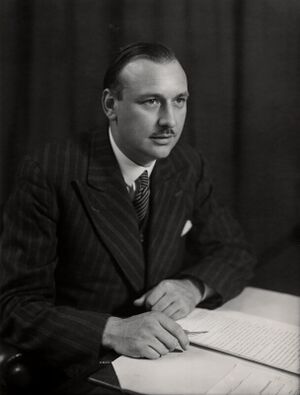Difference between revisions of "Alfred Robens"
(job desc) |
(unstub) |
||
| (One intermediate revision by one other user not shown) | |||
| Line 3: | Line 3: | ||
|imdb=http://www.imdb.com/name/nm2856045/ | |imdb=http://www.imdb.com/name/nm2856045/ | ||
|companydirectorcheck=http://www.companydirectorcheck.com/alfred-robens-4 | |companydirectorcheck=http://www.companydirectorcheck.com/alfred-robens-4 | ||
| − | |description=UK politician | + | |description=UK [[Labour]] politician with aspirations to become Prime Minister. Attended the [[1956 Bilderberg]] |
|nationality=British | |nationality=British | ||
| − | |birth_date=1910 | + | |image=Alfred Robens, Baron Robens of Woldingham.jpg |
| + | |birth_date=18 December 1910 | ||
|birth_place=Manchester, Lancashire, England | |birth_place=Manchester, Lancashire, England | ||
| − | |death_date=1999 | + | |death_date=27 June 1999 |
|death_place=Chertsey, Surrey, England | |death_place=Chertsey, Surrey, England | ||
|constitutes= | |constitutes= | ||
| Line 30: | Line 31: | ||
}} | }} | ||
}} | }} | ||
| + | '''Alfred Robens, Baron Robens of Woldingham''' was an [[England|English]] [[trade union]]ist, [[Labour Party (UK)|Labour]] [[politician]] and [[industrialist]]. He attended the [[1956 Bilderberg meeting]]. | ||
| + | |||
| + | ==Career== | ||
| + | He came from poor [[Manchester]] home, very working class, started as a messenger boy in the local Co-op, doing a stint as an umbrella salesman, and then became a full-time official of the shop workers' union, Usdaw, in [[1935]]. No-one could have had a better Old Labour pedigree. | ||
| + | |||
| + | He was on the Manchester city council from [[1941]] to [[1945]], when he became Labour MP for Wansbeck (Northumberland). That constituency disappeared in 1950 and Robens became MP for neighboring Blyth.<ref name=gaud/> | ||
| + | |||
| + | His political ambitions, including an aspiration to become [[Prime Minister of the United Kingdom|Prime Minister]], were frustrated by bad timing, but his energies were diverted into industry: he spent 10 years as Chairman of the [[National Coal Board]], and later – despite the [[Aberfan disaster]], where 128 children and 28 adults died when a colliery spoil tip collapsed on 21 October 1966 – headed a major inquiry which resulted in the Robens Report on [[occupational health and safety]].<ref name=gaud/> | ||
| + | |||
| + | His outlook was paternalistic; in later life, he moved away from his early [[socialism]] towards the [[Conservative Party (UK)|Conservative Party]]. His reputation remains tarnished by his failure to have foreseen and prevented the Aberfan disaster, followed by actions widely regarded as grossly insensitive during the aftermath of the disaster.<ref name=gaud>https://www.theguardian.com/news/1999/jun/29/guardianobituaries3</ref> | ||
| + | |||
| + | ==After politics== | ||
| + | He became chairman of [[Vickers Ltd]], and of Johnson Matthey Ltd, as well as a director of Trust House Forte and a string of others. He had earlier been a director of the [[Bank of England]], and [[The Times|Times Newspapers Ltd]], and was an original member of the National Economic Development Council from [[1962]]. He sat on the royal commission on trade unions and employers (1965-68), where he advocated tough new legislation to curb unofficial [[strikes]] and secondary picketing.<ref name=gaud/> | ||
| + | |||
| + | |||
| + | |||
{{SMWDocs}} | {{SMWDocs}} | ||
==References== | ==References== | ||
{{reflist}} | {{reflist}} | ||
| − | |||
Latest revision as of 01:51, 4 February 2024
 | ||||||||||||||||||||||||||||||||||
| Born | 18 December 1910 Manchester, Lancashire, England | |||||||||||||||||||||||||||||||||
| Died | 27 June 1999 (Age 88) Chertsey, Surrey, England | |||||||||||||||||||||||||||||||||
| Nationality | British | |||||||||||||||||||||||||||||||||
| Party | Labour, Conservative | |||||||||||||||||||||||||||||||||
UK Labour politician with aspirations to become Prime Minister. Attended the 1956 Bilderberg
| ||||||||||||||||||||||||||||||||||
Alfred Robens, Baron Robens of Woldingham was an English trade unionist, Labour politician and industrialist. He attended the 1956 Bilderberg meeting.
Career
He came from poor Manchester home, very working class, started as a messenger boy in the local Co-op, doing a stint as an umbrella salesman, and then became a full-time official of the shop workers' union, Usdaw, in 1935. No-one could have had a better Old Labour pedigree.
He was on the Manchester city council from 1941 to 1945, when he became Labour MP for Wansbeck (Northumberland). That constituency disappeared in 1950 and Robens became MP for neighboring Blyth.[1]
His political ambitions, including an aspiration to become Prime Minister, were frustrated by bad timing, but his energies were diverted into industry: he spent 10 years as Chairman of the National Coal Board, and later – despite the Aberfan disaster, where 128 children and 28 adults died when a colliery spoil tip collapsed on 21 October 1966 – headed a major inquiry which resulted in the Robens Report on occupational health and safety.[1]
His outlook was paternalistic; in later life, he moved away from his early socialism towards the Conservative Party. His reputation remains tarnished by his failure to have foreseen and prevented the Aberfan disaster, followed by actions widely regarded as grossly insensitive during the aftermath of the disaster.[1]
After politics
He became chairman of Vickers Ltd, and of Johnson Matthey Ltd, as well as a director of Trust House Forte and a string of others. He had earlier been a director of the Bank of England, and Times Newspapers Ltd, and was an original member of the National Economic Development Council from 1962. He sat on the royal commission on trade unions and employers (1965-68), where he advocated tough new legislation to curb unofficial strikes and secondary picketing.[1]
Event Participated in
| Event | Start | End | Location(s) | Description |
|---|---|---|---|---|
| Bilderberg/1956 | 11 May 1956 | 13 May 1956 | Denmark Fredensborg | The 4th Bilderberg meeting, with 147 guests, in contrast to the generally smaller meetings of the 1950s. Has two Bilderberg meetings in the years before and after |